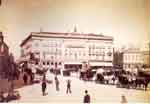The people of Budapest were in confident, buoyant mood, and they felt like an excuse for a massive party. “Now, at last, our true dawn is breaking,” wrote one ecstatic historian, “The daystar of Hungary is about to shine in the European firmament.”
 The joy and optimism were not to last. At the Treaty of Trianon that followed the First World War, Hungary lost two thirds of her territory, and Budapest became the capital of a severely truncated country. This loss of territory at Trianon is still seen by the majority of Hungarians as the greatest tragedy that has befallen them at any time in their history. The 20th century was hard on Hungary. Budapest buildings still bear the bullet scars of its many bloody conflicts. The fall of the Habsburg empire was followed by the shortlived 1919 Republic of Councils or Commune, modelled on the Soviet prototype. It lasted barely a few brutal, triumphalist months before Admiral Horthy and his conservative regime suppressed it and took over. Horthy declared himself Regent (the theory being that he was ruling in place of the Habsburg King Karl IV, exiled in Madeira) and moved into the Royal Palace. Under his leadership a small elite enjoyed a graceful lifestyle, but it was not generally a prosperous time for Budapest. The grand city began to look a little dusty and down-at -heel.
The joy and optimism were not to last. At the Treaty of Trianon that followed the First World War, Hungary lost two thirds of her territory, and Budapest became the capital of a severely truncated country. This loss of territory at Trianon is still seen by the majority of Hungarians as the greatest tragedy that has befallen them at any time in their history. The 20th century was hard on Hungary. Budapest buildings still bear the bullet scars of its many bloody conflicts. The fall of the Habsburg empire was followed by the shortlived 1919 Republic of Councils or Commune, modelled on the Soviet prototype. It lasted barely a few brutal, triumphalist months before Admiral Horthy and his conservative regime suppressed it and took over. Horthy declared himself Regent (the theory being that he was ruling in place of the Habsburg King Karl IV, exiled in Madeira) and moved into the Royal Palace. Under his leadership a small elite enjoyed a graceful lifestyle, but it was not generally a prosperous time for Budapest. The grand city began to look a little dusty and down-at -heel.